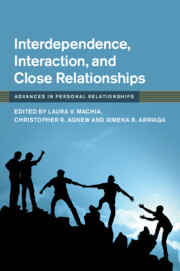Book contents
- Interdependence, Interaction, and Close Relationships
- Advances in Personal Relationships
- Interdependence, Interaction, and Close Relationships
- Copyright page
- Contents
- Figures
- Tables
- Contributors
- Acknowledgments
- Introduction
- Part I Interdependence, Situations, and Context
- Part II Interdependence, Security, and Risk
- Part III Interdependence, Goal Pursuit, and Person Factors
- Part IV Interdependence, Timing, and Expectations
- Index
- References
Introduction
Published online by Cambridge University Press: 19 June 2020
- Interdependence, Interaction, and Close Relationships
- Advances in Personal Relationships
- Interdependence, Interaction, and Close Relationships
- Copyright page
- Contents
- Figures
- Tables
- Contributors
- Acknowledgments
- Introduction
- Part I Interdependence, Situations, and Context
- Part II Interdependence, Security, and Risk
- Part III Interdependence, Goal Pursuit, and Person Factors
- Part IV Interdependence, Timing, and Expectations
- Index
- References
Summary
This passage not only sets the stage for the book, telling the reader what to expect in the 300-plus pages that followed, but clairvoyantly told the field what to expect in the 60-plus years that have followed. IT has indeed been useful as a guide to research and as a way to order the myriad empirical facts uncovered about relationships, not just in social psychology, but in diverse disciplines spanning the social and behavioral sciences. In this volume, we hope once again to contribute some order and simplification to an even more increasingly robust literature, as the simple assumptions of IT remain as relevant as ever.
- Type
- Chapter
- Information
- Publisher: Cambridge University PressPrint publication year: 2020

